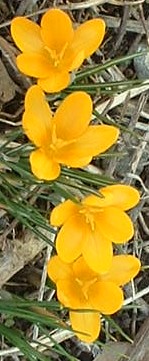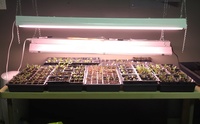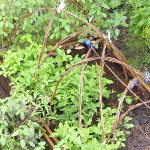Search
Latest topics
» Interesting Marketing for Compostby sanderson Today at 3:24 am
» Cooked worms?
by sanderson Today at 3:21 am
» Indoor Lighting for Kitchen Herbs & Lettuce
by sanderson Today at 3:16 am
» Happy Birthday!!
by sanderson Today at 3:14 am
» Catalog season has begun!
by sanderson Today at 3:13 am
» Mark's first SFG
by sanderson Today at 3:08 am
» Happy Thanksgiving from the USA
by sanderson Today at 3:07 am
» Kiwi's SFG Adventure
by sanderson Today at 3:05 am
» N & C Midwest: Nov. Dec. 2024
by OhioGardener 11/26/2024, 4:08 pm
» Butterbaby Hybrid Squash (Butternut)
by Scorpio Rising 11/24/2024, 8:19 pm
» How does green turn to brown?
by OhioGardener 11/21/2024, 4:58 pm
» Ohio Gardener's Greenhouse
by OhioGardener 11/21/2024, 12:16 pm
» Tree roots, yeeessss.....
by sanderson 11/20/2024, 2:21 am
» The SFG Journey-Biowash
by has55 11/19/2024, 7:37 pm
» What are you eating from your garden today?
by OhioGardener 11/19/2024, 8:27 am
» New SFG gardener in Auckland
by KiwiSFGnewbie 11/16/2024, 11:25 pm
» Thanksgiving Cactus
by OhioGardener 11/12/2024, 5:40 pm
» Need Garden Layout Feedback
by markqz 11/9/2024, 9:16 pm
» Thai Basil
by Scorpio Rising 11/8/2024, 8:52 pm
» How best to keep a fallow SFG bed
by KiwiSFGnewbie 11/8/2024, 8:11 pm
» Preserving A Bumper Tomato Harvest with Freezing vs Canning
by plantoid 11/7/2024, 11:36 am
» What Have You Picked From Your Garden Today
by OhioGardener 11/5/2024, 2:29 pm
» Greetings from Southeastern Wisconsin
by sanderson 11/5/2024, 2:01 pm
» Spinning Compost Bin-need some ideas
by rtfm 11/2/2024, 7:49 pm
» Growing fruit trees in Auckland
by OhioGardener 10/31/2024, 4:23 pm
» Vermiculite -- shipping sale through 10/31/2024
by markqz 10/30/2024, 2:27 pm
» N & C Midwest: October 2024
by Scorpio Rising 10/30/2024, 10:38 am
» Old Mulch and Closing Beds for Winter
by sanderson 10/26/2024, 11:00 pm
» Hello from Land of Umpqua, Oregon Zone 8b
by sanderson 10/25/2024, 3:14 pm
» Hello everyone!
by SFGHQSTAFF 10/24/2024, 3:22 pm
Google
Rookie Topic: Heirlooms vs. Hybrids
+10
Pollinator
Nonna.PapaVino
Turan
GWN
floyd1440
Treefrog
RoOsTeR
No_Such_Reality
southern gardener
cheyannarach
14 posters
Page 1 of 2
Page 1 of 2 • 1, 2 
 Rookie Topic: Heirlooms vs. Hybrids
Rookie Topic: Heirlooms vs. Hybrids
When you are a rookie shopping for seeds and you start noticing heirloom, hybrid, open pollinated, it can all be overwhelming and confusing. Which one do I choose? Did I pick the right one? Well what you choose all depends on your personal opinion and what's right for you in your gardening conditions. I am going to break down some of the differences of heirlooms, hybrids, and open pollinated seeds to help give you a better understanding the next time you are browing through a seed catalog!
We'll start with heirlooms.
{ The definition and use of the word heirloom to describe plants is fiercely debated.
One school of thought places an age or date point on the cultivars. For instance, one school says the cultivar must be over 100 years old, others 50 years, and others prefer the date of 1945 which marks the end of World War II and roughly the beginning of widespread hybrid use by growers and seed companies. Many gardeners consider 1951 to be the latest year a plant can have originated and still be called an heirloom, since that year marked the widespread introduction of the first hybrid varieties. It was in the 1970s that hybrid seeds began to proliferate in the commercial seed trade. Some heirloom plants are much older, some being apparently pre-historic.
Another way of defining heirloom cultivars is to use the definition of the word "heirloom" in its truest sense. Under this interpretation, a true heirloom is a cultivar that has been nurtured, selected, and handed down from one family member to another for many generations.
Additionally, there is another category of cultivars that could be classified as "commercial heirlooms," cultivars that were introduced many generations ago and were of such merit that they have been saved, maintained and handed down - even if the seed company has gone out of business or otherwise dropped the line. Additionally, many old commercial releases have actually been family heirlooms that a seed company obtained and introduced.
Regardless of a person's specific interpretation, most authorities agree that heirlooms, by definition, must be open-pollinated. They may also be open pollinated varieties that were bred and stabilized using classic breeding practices. While there are no genetically modified tomatoes available for commercial or home use, it is generally agreed that no genetically modified organisms can be considered heirloom cultivars. Another important point of discussion is that without the ongoing growing and storage of heirloom plants, the seed companies and the government will control all seed distribution. Most, if not all, hybrid plants, if regrown, will not be the same as the original hybrid plant, thus ensuring the dependency on seed distributors for future crops.} From wikipedia.
Heirlooms are saved year after year because of their superior taste, texture, colors, etc but don't have the shelf life or disease resistance to be a commercial product. All heirlooms are open pollinated which means that a plant will produce seeds naturally and the seeds will have the same characteristics of the parent plant, but hot all open pollinated plants are heirloom. Many heirloom seeds are cultivated in a certain area for so long that they become resistant to the local pests/disease and accustomed to the local weather which can make it more challenging to grow if your climate and pests are different than where these seeds came from.
Hybrids are a cross breed of two different parent plants to give the resulting plant special traits such as cold hardiness, early production, pest and disease resistance, shelf life, crack resistance, etc. Hybrids are created purposfully and by accident (maybe even in your garden). Vegetables are bred to become more appealing to different customers for different uses. Many hybrids are sold commercially for their longer shlef life, abilitity to be mechanically harvested, shipping hardiness among other reasons. Another example of why hybrids are created are to create plants with specialized characteristics for example the early girl tomoato which was made to produce fruit earlier than her sisters. If you were to save seeds from your early girl you will get a plant similar to one of her parent plants, such as good tomatoes but not early producing. There are also many hybrids that are made to be to be more pest and disease resistant, if you live in an area where powdery mildew is often a problem a powdery mildew resistant plant may come in handy in your garden and get you some more produce.
Hope this helps give a little more understanding of how heirlooms differ from hybrids. For the non rookies, just for fun let me know what your favorite heirloom and hybrid plants are to grow and we can compile an ever changing list of top 10 for the forum! It would be a fun way to get new ideas of what to plant next spring!

cheyannarach-
 Posts : 2035
Posts : 2035
Join date : 2012-03-21
Location : Custer, SD
 Re: Rookie Topic: Heirlooms vs. Hybrids
Re: Rookie Topic: Heirlooms vs. Hybrids
good info! thanks!

southern gardener- Posts : 1883
Join date : 2011-06-21
Age : 44
Location : california, zone 10a
 Re: Rookie Topic: Heirlooms vs. Hybrids
Re: Rookie Topic: Heirlooms vs. Hybrids
The difference is really basic.
Heirloom - an old established genetically stable plant. If you bred it true, it will produce seeds that are consistent.
Hybrid - a crossbred plant true to expectation only for this one planting. Saving the seeds will result in plants with a variety of characteristics.
Hybrids are intentionally bred to provide a specific set benefits. It may be early ripening like Early Girl Tomatoes. It may be disease resistance or most often, prolific production, consistent coloration shape or shipability.
Hybrid should not be confused with GMO, genetically modified organisms. Like Roundup Ready Soybeans are produced through direct modification of the DNA genome through modern technology.
Open pollinated simply means the plants are allowed to pollinate through natural means.
Open pollinated, IMHO, is both good and bad. Good in that it's how plants have bred for millions of years. Bad in that, YMMV sense. Some plants, like melons are notorious cross pollinators. So when you have a long company producing a large variety of open pollinated melons.. well, most will be bred true, but you never know. As I understand it, that's the issue with the Monsanto lawsuits with the Soybean farmers. The one farmers GMO crop cross pollinating another farmers non-GMO crop and the non-GMO crop now having the patented DNA.
Heirloom - an old established genetically stable plant. If you bred it true, it will produce seeds that are consistent.
Hybrid - a crossbred plant true to expectation only for this one planting. Saving the seeds will result in plants with a variety of characteristics.
Hybrids are intentionally bred to provide a specific set benefits. It may be early ripening like Early Girl Tomatoes. It may be disease resistance or most often, prolific production, consistent coloration shape or shipability.
Hybrid should not be confused with GMO, genetically modified organisms. Like Roundup Ready Soybeans are produced through direct modification of the DNA genome through modern technology.
Open pollinated simply means the plants are allowed to pollinate through natural means.
Open pollinated, IMHO, is both good and bad. Good in that it's how plants have bred for millions of years. Bad in that, YMMV sense. Some plants, like melons are notorious cross pollinators. So when you have a long company producing a large variety of open pollinated melons.. well, most will be bred true, but you never know. As I understand it, that's the issue with the Monsanto lawsuits with the Soybean farmers. The one farmers GMO crop cross pollinating another farmers non-GMO crop and the non-GMO crop now having the patented DNA.

No_Such_Reality-
 Posts : 665
Posts : 665
Join date : 2011-04-22
Location : Orange County, CA aka Disneyland or Sunset zone 22
 Re: Rookie Topic: Heirlooms vs. Hybrids
Re: Rookie Topic: Heirlooms vs. Hybrids
Cheyanne  thanks for putting up a Rookie Topic! I've been so busy this week it slipped my mind that it was that time again already. Thanks for taking the time out of your busy schedule and putting together another informative topic for us
thanks for putting up a Rookie Topic! I've been so busy this week it slipped my mind that it was that time again already. Thanks for taking the time out of your busy schedule and putting together another informative topic for us 
 thanks for putting up a Rookie Topic! I've been so busy this week it slipped my mind that it was that time again already. Thanks for taking the time out of your busy schedule and putting together another informative topic for us
thanks for putting up a Rookie Topic! I've been so busy this week it slipped my mind that it was that time again already. Thanks for taking the time out of your busy schedule and putting together another informative topic for us 
I am my gardens worst enemy.

RoOsTeR-
 Posts : 4299
Posts : 4299
Join date : 2011-10-04
Location : Colorado Front Range
 Re: Rookie Topic: Heirlooms vs. Hybrids
Re: Rookie Topic: Heirlooms vs. Hybrids
Thank you! It seems pretty simple but that's why it's a rookie topic. When I first started buying seeds and growing plants I didn't know the differences and I am guessing I am not the only one.

cheyannarach-
 Posts : 2035
Posts : 2035
Join date : 2012-03-21
Location : Custer, SD
 Re: Rookie Topic: Heirlooms vs. Hybrids
Re: Rookie Topic: Heirlooms vs. Hybrids
cheyannarach wrote:Thank you! It seems pretty simple but that's why it's a rookie topic. When I first started buying seeds and growing plants I didn't know the differences and I am guessing I am not the only one.
Your right
 All the topics make great reference tools.
All the topics make great reference tools.
I am my gardens worst enemy.

RoOsTeR-
 Posts : 4299
Posts : 4299
Join date : 2011-10-04
Location : Colorado Front Range
 Re: Rookie Topic: Heirlooms vs. Hybrids
Re: Rookie Topic: Heirlooms vs. Hybrids
Great information. It can get confusingfor new gardenners buying seeds and understanding the differences between hydrids and heirlooms varieties.

Treefrog-
 Posts : 15
Posts : 15
Join date : 2012-08-21
Age : 47
Location : Ripon California, Zone 9b
 Re: Rookie Topic: Heirlooms vs. Hybrids
Re: Rookie Topic: Heirlooms vs. Hybrids
Treefrog wrote:Great information. It can get confusingfor new gardenners buying seeds and understanding the differences between hydrids and heirlooms varieties.
So the Brandywine seeds are saved will produce the same tomatoes next year? The question I have is I noticed earlier posts this summer were some had cheese cloth to protect their tomatoes from cross politation so they must have been hybrid......

floyd1440-
 Posts : 815
Posts : 815
Join date : 2011-06-21
Age : 70
Location : Washington, Pa. Zone 6a
 Re: Rookie Topic: Heirlooms vs. Hybrids
Re: Rookie Topic: Heirlooms vs. Hybrids
They were more than likely heirlooms and the cheesecloths were protecting from cross pollination so when they saved those seeds they would remain the same as that plant!

cheyannarach-
 Posts : 2035
Posts : 2035
Join date : 2012-03-21
Location : Custer, SD
 Re: Rookie Topic: Heirlooms vs. Hybrids
Re: Rookie Topic: Heirlooms vs. Hybrids
cheyannarach
Thank you thank you thank you.
Although I have tried to understand the difference many times, the point you made about the hybrids and saving seeds not being true to parents really hit home.
This year I have been given some very special seeds and so feel I have been trusted with the responsibility to nurture these plants and thier offspring and thus pass on the seeds to other gardeners.
I find this concept SOOO incredibly exciting.
Kind of like finding a very special antique. Something from the past to pass on to our children.
Thank you thank you thank you.
Although I have tried to understand the difference many times, the point you made about the hybrids and saving seeds not being true to parents really hit home.
This year I have been given some very special seeds and so feel I have been trusted with the responsibility to nurture these plants and thier offspring and thus pass on the seeds to other gardeners.
I find this concept SOOO incredibly exciting.
Kind of like finding a very special antique. Something from the past to pass on to our children.


GWN- Posts : 2799
Join date : 2012-01-14
Age : 68
Location : british columbia zone 5a
 Re: Rookie Topic: Heirlooms vs. Hybrids
Re: Rookie Topic: Heirlooms vs. Hybrids
 Thank you Janet! It was fun to write!
Thank you Janet! It was fun to write!
cheyannarach-
 Posts : 2035
Posts : 2035
Join date : 2012-03-21
Location : Custer, SD
 Re: Rookie Topic: Heirlooms vs. Hybrids
Re: Rookie Topic: Heirlooms vs. Hybrids
Excellent topic and one that can easily confuse people. I was talking with my mom this winter and found she (long time gardener) had no idea what hybrids vs OP in a catalog meant. I guess it was my dad who explained it to me.
I had long thought that OP just meant homogenetic, that the plants had been so long bred among themselves and selected for uniformity that the genetics had simplified to one set, so they breed true to their type. But now I learn it is a bit more complex than that. Which explains better why getting an OP seed from a catalog and then selecting for seed from the plants I grow in my garden will then select for a line that is specifically better for my conditions.
In tomatoes there are many stories of varieties that demonstrate this. Sudduth's Brandywine is a good example being an old heirloom variety, Brandywine, that was then selected in a families garden for 100 years to be what we now can call Sudduth's strain of Brandwine.
One of my favorite tomatoes is the hybrid Big Beef. Now, 20 years after its introduction to gardeners, there is an OP version 'de-hybridized' by Tomatofest I intend to try this strain this coming spring to see if the OP version will grow well for me. If it does I will start saving its seed and thus personalize the strain for my specific garden.
I had long thought that OP just meant homogenetic, that the plants had been so long bred among themselves and selected for uniformity that the genetics had simplified to one set, so they breed true to their type. But now I learn it is a bit more complex than that. Which explains better why getting an OP seed from a catalog and then selecting for seed from the plants I grow in my garden will then select for a line that is specifically better for my conditions.
In tomatoes there are many stories of varieties that demonstrate this. Sudduth's Brandywine is a good example being an old heirloom variety, Brandywine, that was then selected in a families garden for 100 years to be what we now can call Sudduth's strain of Brandwine.
One of my favorite tomatoes is the hybrid Big Beef. Now, 20 years after its introduction to gardeners, there is an OP version 'de-hybridized' by Tomatofest I intend to try this strain this coming spring to see if the OP version will grow well for me. If it does I will start saving its seed and thus personalize the strain for my specific garden.

Turan-
 Posts : 2618
Posts : 2618
Join date : 2012-03-29
Location : Gallatin Valley, Montana, Intermountain zone 4
 Re: Rookie Topic: Heirlooms vs. Hybrids
Re: Rookie Topic: Heirlooms vs. Hybrids
Cheyanne
I saved some Brandywine seeds without protected the toms with cheesecloth so are they OK to use next year or just toss them as they were open polinated?

I saved some Brandywine seeds without protected the toms with cheesecloth so are they OK to use next year or just toss them as they were open polinated?


floyd1440-
 Posts : 815
Posts : 815
Join date : 2011-06-21
Age : 70
Location : Washington, Pa. Zone 6a
 Brandywine Sudduth's Strain
Brandywine Sudduth's Strain
Thank you, Turan, for mentioning the Sudduth's strain of Brandywine. It is a delightfully taste-full tomato, but in the Pacific Northwest, it's very temperamental: lots of blown blossoms, a sneer at our late-June warming, and an irritating tendency to form blossom end rot while being grown in the midst of other varieties that never show BER. It's true, it's true: YMMV! So I'll send out a plug for a similar tomato that does do well in the PNW: Black Sea Man. Two plants share a re-purposed commercial dryer drum filled with Mel's Mix, a Brandywine Sudduth's Strain and a Black Sea Man. Last time I counted, Brandywine had 7 fruits on it; Black Sea Man had 18 fruits set on it, and we've already harvested 3 ripe Black Sea Man beauties! Nonna

Nonna.PapaVino-
 Posts : 1435
Posts : 1435
Join date : 2011-02-07
Location : In hills west of St. Helens, OR
 Re: Rookie Topic: Heirlooms vs. Hybrids
Re: Rookie Topic: Heirlooms vs. Hybrids
floyd1440 wrote:Cheyanne
I saved some Brandywine seeds without protected the toms with cheesecloth so are they OK to use next year or just toss them as they were open polinated?

Look closely at the flower. On some tomato varieties, you can't see the stigma; it's deep inside. On others, the stigma sticks out beyond the anther tube. That will tell you what the chances are of the tomato crossing.
For the ones where the stigma is hidden, it's much less likely to receive pollen grains from another plant. Outcrossing probably will run 5% or less.
For the ones with the exerted stigma, outcrossing will be much greater, and these would definitely need to be bagged and hand pollinated, if you want to save seeds that are true to variety.
 Re: Rookie Topic: Heirlooms vs. Hybrids
Re: Rookie Topic: Heirlooms vs. Hybrids
Thank you PollinaterPollinator wrote:floyd1440 wrote:Cheyanne
I saved some Brandywine seeds without protected the toms with cheesecloth so are they OK to use next year or just toss them as they were open polinated?

Look closely at the flower. On some tomato varieties, you can't see the stigma; it's deep inside. On others, the stigma sticks out beyond the anther tube. That will tell you what the chances are of the tomato crossing.
For the ones where the stigma is hidden, it's much less likely to receive pollen grains from another plant. Outcrossing probably will run 5% or less.
For the ones with the exerted stigma, outcrossing will be much greater, and these would definitely need to be bagged and hand pollinated, if you want to save seeds that are true to variety.

cheyannarach-
 Posts : 2035
Posts : 2035
Join date : 2012-03-21
Location : Custer, SD
 Re: Rookie Topic: Heirlooms vs. Hybrids
Re: Rookie Topic: Heirlooms vs. Hybrids
Nonna.PapaVino wrote:Thank you, Turan, for mentioning the Sudduth's strain of Brandywine. It is a delightfully taste-full tomato, but in the Pacific Northwest, it's very temperamental: lots of blown blossoms, a sneer at our late-June warming, and an irritating tendency to form blossom end rot while being grown in the midst of other varieties that never show BER. It's true, it's true: YMMV! So I'll send out a plug for a similar tomato that does do well in the PNW: Black Sea Man. Two plants share a re-purposed commercial dryer drum filled with Mel's Mix, a Brandywine Sudduth's Strain and a Black Sea Man. Last time I counted, Brandywine had 7 fruits on it; Black Sea Man had 18 fruits set on it, and we've already harvested 3 ripe Black Sea Man beauties! Nonna
My experience is similar to yours. I think Suddoth is particularly good at illustrating the concept of a particular strain of a type being best for its own climate (which is to be expected). It probably is great in parts of the Mid West... but not here at least for me.
Thanks for the suggestion of Black Sea Man.... I just saw its seed in Tomatofest and have now put it on the list to try. I grew Purple Cherokee this year and it did great. Paul Robeson not so well.

Turan-
 Posts : 2618
Posts : 2618
Join date : 2012-03-29
Location : Gallatin Valley, Montana, Intermountain zone 4
 Re: Rookie Topic: Heirlooms vs. Hybrids
Re: Rookie Topic: Heirlooms vs. Hybrids
Pollinator wrote:floyd1440 wrote:Cheyanne
I saved some Brandywine seeds without protected the toms with cheesecloth so are they OK to use next year or just toss them as they were open polinated?

Look closely at the flower. On some tomato varieties, you can't see the stigma; it's deep inside. On others, the stigma sticks out beyond the anther tube. That will tell you what the chances are of the tomato crossing.
For the ones where the stigma is hidden, it's much less likely to receive pollen grains from another plant. Outcrossing probably will run 5% or less.
For the ones with the exerted stigma, outcrossing will be much greater, and these would definitely need to be bagged and hand pollinated, if you want to save seeds that are true to variety.
Good post Pollinator. I just used one tomato and saved the seeds but do not know if they have been contaminated by other tomato plants so my question is should I pitch them and do it right next year?
First time saving seeds and I have some more that I purcheased last winter. It is good practice just saving seeds though as that is a learning curve as well,,,


floyd1440-
 Posts : 815
Posts : 815
Join date : 2011-06-21
Age : 70
Location : Washington, Pa. Zone 6a
 Re: Rookie Topic: Heirlooms vs. Hybrids
Re: Rookie Topic: Heirlooms vs. Hybrids
Personally I would go ahead and use the seeds, if you are really concerned I would also plant backups as well! I wouldn't pitch them! Live and learn is my motto! Good luck with them!

cheyannarach-
 Posts : 2035
Posts : 2035
Join date : 2012-03-21
Location : Custer, SD
 Re: Rookie Topic: Heirlooms vs. Hybrids
Re: Rookie Topic: Heirlooms vs. Hybrids
The Foundation posted this on their Facebook page. Normally, I just share their postings under "Facebook - SFG Foundation postings", but this one is good information for all gardeners. So, I posted it under an existing Rookie Topic.
The difference between open-pollinated, heirloom, and hybrid seeds:
http://blog.seedsavers.org/blog/open-pollinated-heirloom-and-hybrid-seeds
The difference between open-pollinated, heirloom, and hybrid seeds:
http://blog.seedsavers.org/blog/open-pollinated-heirloom-and-hybrid-seeds
 Re: Rookie Topic: Heirlooms vs. Hybrids
Re: Rookie Topic: Heirlooms vs. Hybrids

Scorpio Rising-
 Posts : 8841
Posts : 8841
Join date : 2015-06-12
Age : 62
Location : Ada, Ohio
 Re: Rookie Topic: Heirlooms vs. Hybrids
Re: Rookie Topic: Heirlooms vs. Hybrids
I enjoy these rookie topics. Thanks for bumping them sanderson. After reading this one, a pretty complex question came to mind, so I wil try to make it as simple as possible initially. I will be growing about 8 different heirloom varieties in the same proximity this spring (god willing:D). Big, Small , Red , Purple, Black , Paste , slicing ect. Ect . Their will also be a few hybrids in the mix to ensure that I get some good tomatoes as I have never grown heirlooms before.
My question is in regard to saving seeds and cross pollination. With this variable cornucopia I will have going on within a 40 square area , will the seeds from the heirlooms be at all true?
If I were to continue to save seeds from plants from the seeds I previously saved year after year, will I eventually end up with all the seeds producing the same variety ?
Would the seeds keep the good characteristics and remove the bad ones? How does that work?
Can anyone shed some light on this for me? I guess I’m becoming a Garden nerd because this seems very interesting to me .
I’m 44. Wondering if at 84 I will be growing rainbow creole cherowine paste tomatoes????
My question is in regard to saving seeds and cross pollination. With this variable cornucopia I will have going on within a 40 square area , will the seeds from the heirlooms be at all true?
If I were to continue to save seeds from plants from the seeds I previously saved year after year, will I eventually end up with all the seeds producing the same variety ?
Would the seeds keep the good characteristics and remove the bad ones? How does that work?
Can anyone shed some light on this for me? I guess I’m becoming a Garden nerd because this seems very interesting to me .
I’m 44. Wondering if at 84 I will be growing rainbow creole cherowine paste tomatoes????

brianj555-
 Posts : 444
Posts : 444
Join date : 2017-08-22
Location : Zone 9 - Mississippi
 Re: Rookie Topic: Heirlooms vs. Hybrids
Re: Rookie Topic: Heirlooms vs. Hybrids
Will you get cross-pollination between closely spaced varieties? It's possible. Tomatoes can self-pollinate, but insects and wind can get involved resulting in crosses - and some tomato varieties are more susceptible to crossing than others. One site suggested that adjacent plants would still result in 95% purity. That's probably enough for a home-gardener who is not sharing/selling seeds. If you want higher purity, you can bag the flowers in reemay or some other fine fabric (not plastic) before they fully form, to keep "foreign" pollen and insects out. Then keep the seeds from just those fruits that form from the protected flowers.brianj555 wrote:I enjoy these rookie topics. Thanks for bumping them sanderson. After reading this one, a pretty complex question came to mind, so I wil try to make it as simple as possible initially. I will be growing about 8 different heirloom varieties in the same proximity this spring (god willing:D). Big, Small , Red , Purple, Black , Paste , slicing ect. Ect . Their will also be a few hybrids in the mix to ensure that I get some good tomatoes as I have never grown heirlooms before.
My question is in regard to saving seeds and cross pollination. With this variable cornucopia I will have going on within a 40 square area , will the seeds from the heirlooms be at all true?
If I were to continue to save seeds from plants from the seeds I previously saved year after year, will I eventually end up with all the seeds producing the same variety ?
Would the seeds keep the good characteristics and remove the bad ones? How does that work?
Can anyone shed some light on this for me? I guess I’m becoming a Garden nerd because this seems very interesting to me .
I’m 44. Wondering if at 84 I will be growing rainbow creole cherowine paste tomatoes????
Your tomatoes will all be true this year because the fruit is the ovary of the parent plant - the fruit is unaffected by cross-pollination - it's next year's fruit that might be different. (You probably already knew that, but my experiences suggest it's a common point of confusion for people, so I want to be clear for others also reading this thread now, or in the future.)
If cross-pollination occurs, the resulting seeds will be a mix of the "good" and "bad" characteristics of the parents. I have good and bad in quotes because what's good or bad depends on the environment -- and the opinions of the grower. A tomato that grows well in a hot environment could be good or bad depending on where the tomato is growing. If a seed grows into a plant that is genetically susceptible to a disease and it dies before it makes fruits (and thus makes no seeds), it cannot pass on that bad characteristic (disease susceptibility), even if it would have grown extra tasty tomatoes. If the disease does not get into your garden, and the plant survives and you save the seeds from those extra tasty tomatoes, some of those seeds will still grow into disease susceptible plants. So it's partially nature selecting what's good and bad, and partly you deciding what's good and bad, and part of it is just random.
Heirlooms are inbred to the point where the genetics are stabilized, and you get the same thing whether your Brandywine pollinates itself, or a different Brandywine pollinates it. If you cross two different varieties of plants, a Brandywine and a Roma, the seeds from that cross will be hybrids. Some crosses give a very consistent result, and those are the hybrids companies make on purpose to sell. (They usually keep the names of one or both parents a secret.) Other crosses give different/inconsistent results - different colors, sizes, shapes (consistent per plant, but not between sibling plants.) And if a hybrid crosses with itself you often get a bunch of variation in the offspring plants. Selecting among those offspring for those like the hybrid, over and over, for a few years until you stop getting variations out is one way new varieties are created. But sometimes the desired traits can't be stabilized this way, and the only way to get them is with hybrids. (This has to do with homozygous vs heterozygous genes, but then we start getting into genetics.)


BeetlesPerSqFt-
 Posts : 1433
Posts : 1433
Join date : 2016-04-11
Location : Centre Hall, PA Zone 5b/6a LF:5/11-FF:10/10
 Re: Rookie Topic: Heirlooms vs. Hybrids
Re: Rookie Topic: Heirlooms vs. Hybrids
In 42 years of not isolating the breeding of a group of tomatoes will you end up with rainbow creole cherowine paste tomatoes? 
Maybe, as Beetle explained. You would be selecting which plants seem the best for your own situation and Ma Nature would be a big help in that. So you should end up with something that is specifically good for your tastes and garden. It is best for such efforts to have plenty plants of each type, so you have a selection to select from. I think this type of breeding results in what is called a landrace breed. I did this with a flour corn and the results do pretty well in my specific area, and I want to attempt it with squash. However it is easier to grow a lot of plants of corn than of squash or even tomatoes.
Maybe, as Beetle explained. You would be selecting which plants seem the best for your own situation and Ma Nature would be a big help in that. So you should end up with something that is specifically good for your tastes and garden. It is best for such efforts to have plenty plants of each type, so you have a selection to select from. I think this type of breeding results in what is called a landrace breed. I did this with a flour corn and the results do pretty well in my specific area, and I want to attempt it with squash. However it is easier to grow a lot of plants of corn than of squash or even tomatoes.

Turan-
 Posts : 2618
Posts : 2618
Join date : 2012-03-29
Location : Gallatin Valley, Montana, Intermountain zone 4
Page 1 of 2 • 1, 2 
 Similar topics
Similar topics» No Rookie Topic?
» Friday Rookie Topic: Sunflowers
» Friday Rookie Topic: When To Harvest Veggies
» Friday's Rookie Topic I
» Friday's Rookie Topic VI: SHALLOTS
» Friday Rookie Topic: Sunflowers
» Friday Rookie Topic: When To Harvest Veggies
» Friday's Rookie Topic I
» Friday's Rookie Topic VI: SHALLOTS
Page 1 of 2
Permissions in this forum:
You cannot reply to topics in this forum










